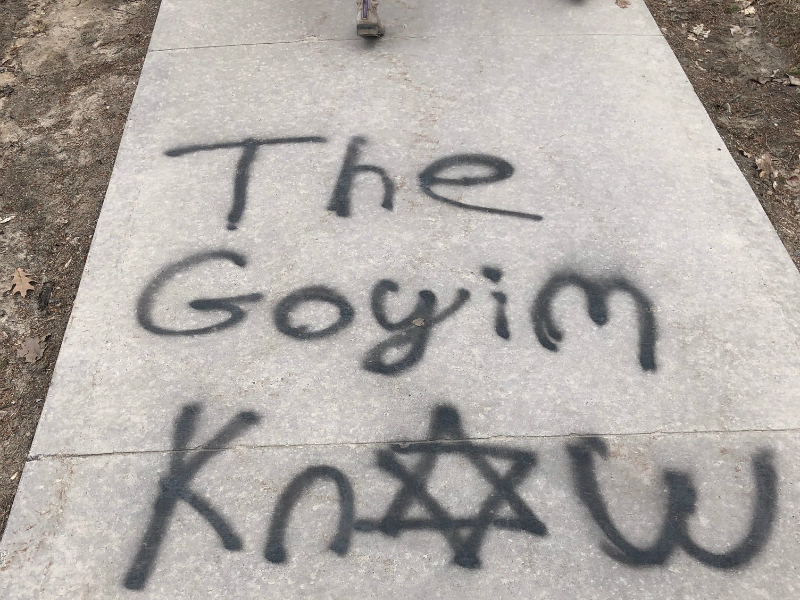Hate crimes in Canada decreased in 2018, but Jews remained the most targeted group for hate-related offences, the most recent numbers show.
Last year, hate crimes against Jews dropped by four per cent from the year before, but Jews still accounted for nearly one-fifth of all hate-related offences in 2018, Statistics Canada reported on July 22.
Across Canada, police reported 347 hate crimes against Jews in 2018, down from 360 in 2017.
B’nai Brith Canada noted that the latest figures on Jews continue a trend from previous years. It said that while Jews comprise just one per cent of the country’s population, they were the targets of 19 per cent of hate crimes last year, up from 17 per cent in 2017.
The figures “demonstrate that anti-Semitic hate crimes remain an urgent concern, with one occurring almost every day of the year, on average,” said Michael Mostyn, CEO of B’nai Brith Canada.
That is why, Mostyn added, B’nai Brith is urging all levels of government to take serious steps to combat anti-Semitism, including adopting the International Holocaust Remembrance Alliance (IHRA) definition of anti-Semitism, as the federal government did recently, “for greater clarity.”
B’nai Brith said it also continues to urge government agencies to implement its “Eight-Point Plan to Tackle Anti-Semitism.”
READ: JEWS THE MOST TARGETED GROUP FOR HATE CRIMES IN TORONTO
The Centre for Israel and Jewish Affairs (CIJA) said it is encouraged to see an overall decline in hate crimes, “though a single such incident against any community is one too many.”
CIJA CEO Shimon Koffler Fogel said he is concerned that despite a decline in hate crime generally, incidents targeting Jews remained relatively stable after a sharp spike in 2017.
“While most Canadians reject anti-Semitism, this data confirm the persistence of Jew-hatred, which is seeing an alarming global rise,” Fogel said.
CIJA pointed out that regional data reveal that among Canada’s three largest cities, Vancouver now has the highest rate of hate crimes – moving from third place in a single year to surpass Montreal and Toronto.
Indeed, the numbers show that Vancouver has Canada’s third-highest number of hate-motivated crimes, at 187, but its hate crime rate, per 100,000 residents, is now higher than Montreal’s and Toronto’s.
Following a 47 per cent increase in 2017, the number of overall police-reported hate crimes in Canada fell by 13 per cent in 2018, from 2,073 violations, to 1,798 incidents, StatsCan said.
Even with this decline, the number of hate crimes remains higher – with the exception of the spike in 2017 – than any other year since 2009, “and aligns with the upward trend observed since 2014,” the agency stated.
The StatsCan figures show that, in 2018, non-violent hate crimes, down by 23 per cent over 2017, declined more than violent hate crimes, which decreased by seven per cent over the previous year.
The latest numbers show that the most common hate crime last year overall was mischief, followed by threats and “level one” assault – or assault that is not aggravated and does not involve a weapon or bodily harm.
The numbers also showed that, after Jews, the most targeted group in 2018 was black people, with 283 reported hate crimes, followed by incidents targeting Muslims and people based on their sexual orientation, with 173 violations each.
Nationally, the number of hate crimes targeting Muslims fell 50 per cent, after spiking in 2017 when large increases were reported in Ontario and Quebec. In 2018, there were also fewer police-reported hate crimes targeting black people – down 12 per cent from 2017 – and fewer related to sexual orientation, down 15 per cent over the previous year.
The year-to-year decrease in hate crimes was almost entirely a result of declines in Ontario, StatsCan said.
“It’s 2019 and it’s outrageous that the Canadian Jewish community is still being targeted by hate crimes after more than 250 years of integration into this beautiful country,” said Friends of Simon Wiesenthal Center CEO Avi Benlolo.
Much of today’s anti-Semitism comes from “a rising tide of white supremacism, the radical left and also from some elements in the Muslim community at events like Al-Quds Day and university campaigns like Israeli Apartheid Week and the promotion of the boycott, divestment and sanctions campaign against the Jewish state,” Benlolo said in a written statement.
